Salary Surveys
14th Annual Redmond Salary Survey: Good News, with Strings Attached
Redmond magazine's annual survey of Microsoft IT compensation shows that, despite a global recession, respondents reported higher average salaries -- but lost some ground with raises and bonuses.
| More Salary Survey |
 The PDF format of this article boasts many more charts, including average salaries by state and reigon, information on outsourcing and more. Free registration is required to get the PDF. Get it here. The PDF format of this article boasts many more charts, including average salaries by state and reigon, information on outsourcing and more. Free registration is required to get the PDF. Get it here. |
We're in the midst of a massive recession that's approaching the two-year mark. In 2008, when we reported that salaries in the Microsoft IT community went up, the recession had respondents wondering if IT salaries had finally hit a high mark. A year later, the recession has gone global, but amazingly it hasn't had the impact on base compensation that we expected. The overall base salary this year? $83,113. While 36.5 percent of survey participants said they saw no change in salary from last year, nearly half claimed their salary was higher in 2009 (see Chart 1).
It's good news so far, but it certainly caught us with our guard down. The same was the case for Brent Magenbauer, a survey respondent and server team leader at Centra Health in Lynchburg, Va. He expected a more modest increase, “considering our economy and the poor state that many companies are in.”
Tony F., a technical architect in Austin, Texas, who got a peek at the numbers, believes the results are due to companies "attempting to retain more 'useful' employees," to build strength against the recession.
James Robbins, Jr., a member of the Computer IT's Adjunct Faculty at Community College of Beaver County in Pittsburgh, suspects salaries jumped because more companies off-shored lower-skilled talent over those five years, so specialized workers remaining within the United States are getting paid more.
Both guesses are good ones, but we honestly can't tell if this year's results bear them out. What we do know is this: Despite the recession and reports of decreased spending and job losses, those who remain employed and working with Microsoft technologies fared better than average IT workers.
We can't make a direct comparison to the results of our past surveys, but we can place our survey in context with others to give you an idea of why this year's base salary is good news.
Take the U.S. Department of Labor's Bureau of Labor Statistics (BLS) figures released in July. According to BLS data compiled in mid-2007, the median salary for computer systems specialists and systems administrators was $68,130. Redmond readers, whose median salary is $78,156, fared better by 14 percent. (Although the data was just released, it's compiled from numbers that were gathered in mid-2007.)
That Redmond readers saw salaries go higher in 2009 also jives with a 2009 Computer Economics Inc. projection. The Computer Economics reports show IT salaries rising by 2 percent. InformationWeek's 2009 results are similar, at 1.67 percent higher. Its survey shows median salaries at $80,000.
A Janco Associates Inc. survey doesn't show as much optimism as our results do. Janco reports salaries for middle managers at large enterprises rising 0.43 percent to $79,575 from 2008 to 2009, but for midsize enterprises, the numbers go down 0.24 percent to $72,272.
Where Does It Hurt?
This year's compensation is a mix of good news and bad. While many respondents report getting raises or bonuses, fewer overall received these boosts and many didn't get as much as they did last year. A look at raises shows respondents reporting they expect an average of only $1,569 in additional compensation this year. Companies may be looking to retain good employees, but they're clearly taking a tough look at incentives as they face the bigger prospect of staying financially afloat in these harsh times.
Derek Martin, a systems engineer in Eugene, Ore., told Redmond that "raises were cut out this year" at his company. Count Derek among the 35.5 percent of respondents who said they had no raise at all (see Chart 2). Including those who said they had their pay cut, we're looking at a bleak reality of 44.5 percent of respondents making the same or less money.
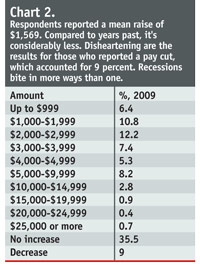
[Click on image for larger view.] |
Many of the respondents we contacted said their companies frequently offer raises based on sales or merit. Even with the recession, Gerhard Ziegler, a LAN administrator in Parkville, Md., expects his raise will land between 3 percent to 4 percent, while Tony F. is optimistic that he'll see a raise that closely resembles a cost-of-living adjustment of around 5 percent.
We also asked respondents to offer insights into next year's raises (see Chart 4b). Of those who expect a raise, 23 percent believe they'll see an extra $1,000 to $3,000. Another 13 percent expect to get within the $3,000 to $4,999 range. Maybe it's a sign of hard times ahead when the number of respondents who expect a raise shrinks by 25 percent.
The bonus picture was brighter; $3,046 on average for those who received one. But Chart 3a shows a grim statistic: 52.4 percent reported no bonus at all. "The recession is definitely a factor," says Peter Z., an applications engineer with a value-added reseller in Illinois. "Bonuses never materialized because the company didn't meet its stated sales goals."
Peter's experience is par for the course, if Chart 3b is any indication: 22.6 percent of companies award bonuses based on profitability. There's a majority if you add to that another 30.8 percent who measure bonuses based on a combination of profitability and personal performance.
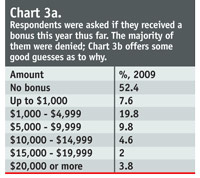
[Click on image for larger view.] |
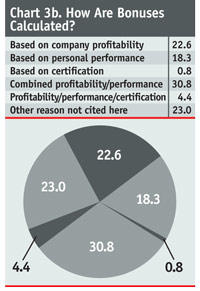
[Click on image for larger view.] |
Role Play
How did job roles affect salaries? Chart 4 shows base salaries by job title. Managers in years past have typically held the top-salaried title. This year, managers are outflanked by programming project leads with no supervisory responsibilities, who make up 6.8 percent of the respondents. These leads' salaries exceed the six-figure mark, at $100,635 on average. Managers are the largest responding segment at 34.1 percent. They claim the second spot at $98,907. One in four respondents said they're a systems administrator. Sysadmins average $70,491.
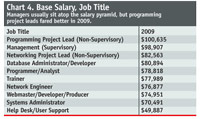
[Click on image for larger view.] |
Chart 5 shows how tenure can affect salaries. With a few anomalies, most salaries show a progression of higher salaries the longer one stays in IT. Experienced respondents with manager and programming project-lead titles made well over six figures this year. In other words, it pays to remain in IT.
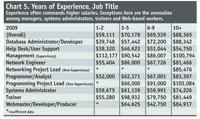
[Click on image for larger view.] |
Technology's Cutting Edge
Historically, those with hotter, more current technology expertise have a decided advantage (see Chart 7). Those who work with Oracle RDBMS made serious coin this year, at $100,522. Specialists who work for outsourcing firms and extranets round out the top three, at $97,350 and $96,879, respectively. It's no surprise that those who work with portable and embedded computing devices are making $95,228, as companies scramble for experts who can make workers more productive via their iPhones and BlackBerry devices.
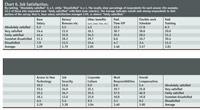
[Click on image for larger view.] |
Help desk technicians came in at the bottom rung of the salary ladder. Making $76,885 isn't bad for a position that might be considered entry-level, but take this number with a grain of salt. Those who answered this part of the survey claimed more than one skill, meaning some of the higher-end managers who oversee help desk technicians were counted here as well.
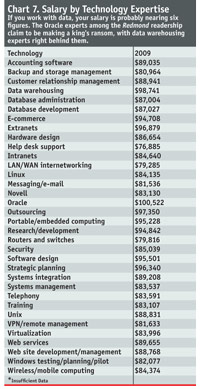
[Click on image for larger view.] |
We also asked respondents what Microsoft technologies they specialized in. Microsoft has been playing up its unified communications strategy this year, and it looks like companies are willing to pay for experts with Live Communications skills to the tune of $111,750. $109,202 for Content Management Server experts and $103,858 for Application Center complete yet another, impressive top-three list.
If you predicted that experts who claim Windows operating system skills reported lower salaries, you'd be nothing short of a mind reader. At the bottom rungs of the salary ladder are IT professionals whose primary work is managing the Microsoft OS: $55,455 for NT techs, $55,911 for Windows client support and $66,844 for Windows Vista technicians.
What This Year's Survey Means
If we have to boil down the numbers to derive any meaning, it comes down to this: Companies will be looking to Microsoft technology to bring them out of these financial doldrums. There are hints of that taking place with forecasts of strong Windows 7 and Windows Server 2008 upgrade plans later this year and the growing use of SharePoint and Microsoft's messaging platforms. To make all of this stuff work, there will always be a need for well-informed, well-trained, experienced Microsoft IT professionals, and companies will pay a premium to hire and retain them.